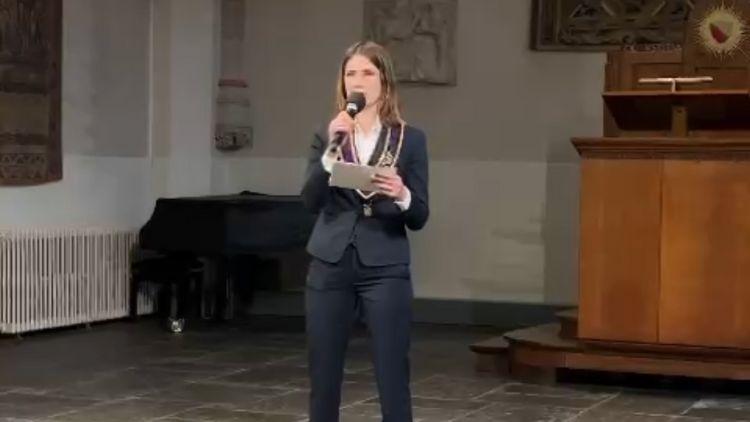Unexpected pro-Palestine statement during summer drinks with students
'Which side of History do we want to be on?'

The traditional summer drinks for students serving on student organisations' boards took place in the Utrecht University Building on Monday, June 17. The event allows the UU and HU executive boards to thank and recognise these students' work throughout the past year.
There are always a few short speeches during this event. For example, Romy van den Driessche, who chairs Stuf, the student committee of the Utrecht University Fund, talked about the activities financed by Stuf last year, such as a study trip, a concert and a conference.
However, she didn't let go of the microphone after her speech. At the end, she said: “Let us continue to work together towards a future where every student has the opportunity to shine, both inside and outside the lecture halls.” Then, she unexpectedly continued with the following statement: “And when I say 'every student' I really mean every student, including students who are being monitored by an oppressive regime, students whose critical voices are suppressed, and students whose universities have been destroyed.”
Dialogue alone is not enough
She then referred to Gaza, the six Palestinian universities that have been destroyed, and the Israeli bombing that killed more than 35,000 Palestinians. She finds it strange that the university does not want to halt its ties with Israeli institutions, citing academic freedom. “The argument is that dialogue is important. But dialogue is not enough when fundamental human rights are violated,” Romy said in the auditorium of the Utrecht University Building. “Don't be a coward and listen to the students. An academic boycott is the least you could do. Which side of history do we want to be on?”
Rector Henk Kummeling responded briefly to the speech. “We, members of the board, are thinking deeply about this issue, alongside other university administrators in the country and elsewhere. We have come to a different conclusion. We are looking for a form of collaboration that would allow us to help the people in those areas. The question is whether a boycott is the most desirable solution, especially now that many Israeli students and employees are protesting against the actions taken by Netanyahu's government.”
Using the function
The University Fund is not pleased by what the chair of their student committee has done. Robbert-Jan Feunekes: “It looks like she made this statement on behalf of the University Fund. We were not aware she was going to do that and we talked to her about it.”
Romy is glad she spoke her mind. "It was quite nerve-wracking to do that, but I concluded that it was important to seize this opportunity. In my opinion, the board does not listen to the activists enough and I could use the opportunity I was given to deliver this meaningful message. I was pleasantly surprised by the applause and support I got from the student administrators who were there. We do not want to cut ties with the Israeli students and employees who protest against Netanyahu's policies, of course. We are against the institutional contacts that make the regime possible. The board indicates that it is working on it, but I think it is doing too little too late."